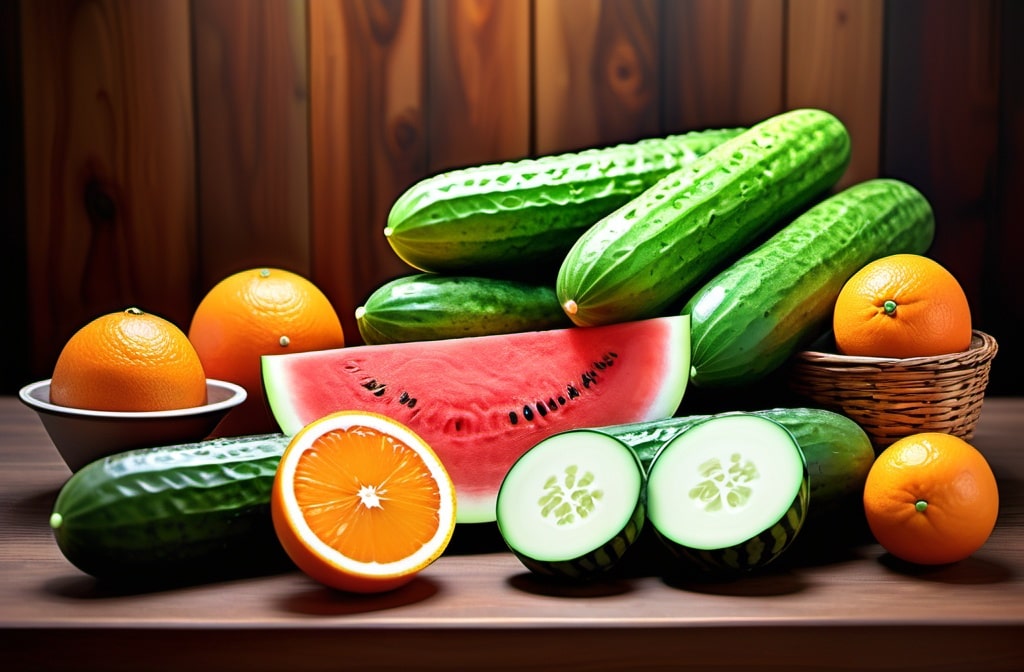Staying hydrated is essential for maintaining good health, and one of the best ways to do this is by eating water rich foods. While drinking plain water is important, you can also boost your hydration levels by including plenty of fruits and vegetables with high water content in your diet.
In this article, we'll explore the many benefits of water rich foods and provide a list of some of the most hydrating options to add to your meals and snacks. By the end, you'll have a better understanding of how these nutritious foods can support your overall health and wellness.
The Importance of Hydration
Before diving into specific water rich foods, let's talk about why hydration is so crucial for your body. Every cell, tissue, and organ needs water to function properly. Water plays a key role in:
Regulating body temperature
Transporting nutrients and oxygen to cells
Removing waste products
Lubricating joints
Supporting healthy skin, hair, and nails
When you don't get enough fluids, you may experience symptoms of dehydration such as fatigue, headaches, dizziness, and dry mouth. Chronic dehydration can lead to more serious health problems over time.
While plain water is the best choice for staying hydrated, eating water rich foods can also contribute to your daily fluid intake while providing valuable nutrients like vitamins, minerals, and fiber. Let's take a closer look at some of the top water rich foods to include in your diet.
Fruits with High Water Content
Many fruits are naturally high in water, making them a refreshing and hydrating choice. Here are some of the juiciest options:
Watermelon (92% water): This summertime favorite is one of the most hydrating foods you can eat. It's also a good source of vitamin C and lycopene.
Strawberries (91% water): Berries are a great way to add flavor and nutrition to your water intake. Strawberries are rich in antioxidants and fiber.
Grapefruit (88% water): Known for its tart taste, grapefruit is a hydrating and low-calorie choice. It's also high in immune-boosting vitamin C.
Cantaloupe (90% water): This sweet melon is an excellent source of vitamins A and C, as well as potassium, which can help regulate fluid balance.
Peaches (89% water): Juicy peaches are a good source of vitamins A and C, as well as fiber for digestive health.
Other hydrating fruits include oranges, pineapple, raspberries, apricots, and plums. Aim to include a variety of colorful fruits in your diet to maximize the nutritional benefits.
Vegetables with High Water Content
Like fruits, many vegetables have a high water content that can contribute to your hydration levels. Here are some top picks:
Cucumber (96% water): Cucumbers are one of the most hydrating veggies out there. They're also low in calories and high in nutrients like vitamin K and potassium.
Lettuce (96% water): Leafy greens like lettuce are a great way to add volume and hydration to your meals without a lot of calories. They're also rich in vitamins and minerals.
Zucchini (95% water): This versatile squash is mostly water and provides vitamin C, potassium, and fiber. It works well in both cooked and raw dishes.
Celery (95% water): Known for its satisfying crunch, celery is a good source of water and fiber. It also contains vitamins A, C, and K.
Tomatoes (94% water): Whether you consider them a fruit or a vegetable, there's no denying that tomatoes are a hydrating and nutritious choice. They're high in lycopene, vitamin C, and potassium.
Other water rich veggies include bell peppers, spinach, cauliflower, broccoli, and carrots. Try to eat a rainbow of colorful vegetables to get a wide range of nutrients and antioxidants.
How to Incorporate More Water Rich Foods into Your Diet
Now that you know some of the best water rich foods to eat, here are some tips for adding more of them to your meals and snacks:
Start your day with a hydrating breakfast: Top a bowl of oatmeal or yogurt with fresh berries and sliced peaches, or blend up a smoothie with watermelon, cucumber, and mint.
Pack water rich snacks: Cut up cucumbers, celery, and bell peppers to dip in hummus, or enjoy a fruit salad with melon and berries.
Add more veggies to your meals: Pile your sandwiches and wraps high with lettuce and tomato, or add zucchini noodles to your favorite pasta dishes.
Make a refreshing salad: Toss together leafy greens, cucumber, tomatoes, and any other water rich veggies you like. Top with a light vinaigrette or a squeeze of lemon juice.
Freeze fruits for a cooling treat: Blend up watermelon or peaches and freeze in popsicle molds, or enjoy frozen grapes straight out of the freezer.
Remember, while water rich foods can contribute to your hydration, it's still important to drink plenty of plain water throughout the day. Aim for at least 8 cups (64 ounces) of fluids daily, or more if you're physically active or in a hot climate.
The Bottom Line
Incorporating water rich foods into your diet is a simple and delicious way to support your hydration levels and overall health. By choosing fruits and vegetables with high water content, you'll not only be boosting your fluid intake but also getting valuable vitamins, minerals, and fiber.
Some of the most hydrating foods include watermelon, strawberries, cucumber, lettuce, and zucchini, but there are plenty of other juicy options to choose from. Try to eat a variety of colorful produce to maximize the nutritional benefits.
Remember, while these foods can contribute to your hydration, it's still important to drink plenty of plain water throughout the day. Aim for at least 8 cups of fluids daily, and listen to your body's thirst cues.
By making water rich foods a regular part of your eating pattern, you'll be taking a simple but powerful step towards better health and wellness. So next time you're looking for a refreshing snack or planning a meal, remember to think about foods with high water content. Your body will thank you!

